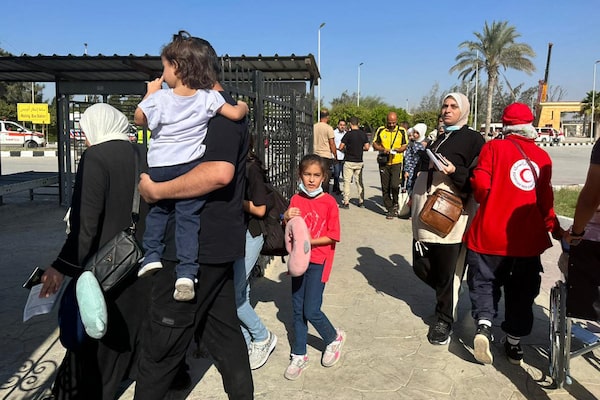
People cross into Egypt's Rafah border crossing with the Gaza Strip, on November 9, 2023.-/AFP/Getty Images
As the first Canadians to escape the Gaza Strip since the start of the war between Israel and Hamas settled into Cairo hotel rooms, a second set of evacuees remained trapped in the war-ravaged Palestinian enclave, stymied by erratic closings of a border crossing that serves as the only way out.
A group of 75 Canadians, permanent residents of Canada and their eligible family members were allowed to cross Gaza’s Rafah border with Egypt on Tuesday. At least 29 more appeared on a list of 560 people approved to make the crossing on Wednesday.
But unspecified security concerns led officials to close the border unexpectedly before any of Wednesday’s evacuees could get through, stranding hundreds of people desperate to escape as the war entered a second month.
Global Affairs Canada confirmed the closing in a statement. It said the government is hopeful the border will reopen on Thursday, but that Canadians should prepare for “significant delays and unexpected closures.”
In Cairo, the 75 exhausted Canadians who managed to flee on Tuesday arrived in hotel rooms early the next morning, keen for good meals and warm showers, but also feeling a sense of survivor’s guilt. Water, food and other necessities have been scarce in Gaza since Israel laid siege to the territory after an Oct. 7 attack by the militant group Hamas.
Nabil Elsherif, whose elderly parents had been trapped in Gaza, was waiting for the busload of Canadians as it arrived at the hotel. When he saw his father walk through the lobby doors, he ran to him.
“Everyone cried,” Mr. Elsherif said. “And I mean everyone, including people representing the Canadian embassy. Honestly, we would watch the news over the last month and feel we lost them. To see your parents after feeling that loss – I can’t describe it. We are so blessed to have them out of this nightmare.”
After the emotional reunion, his father had one request. He had subsisted largely on bread and water for weeks. “I need a mixed grill plate,” he told his son. That request was quickly granted. Another was denied.
“My parents kept telling me to set up the TV to watch the news from Gaza,” Mr. Elsherif said. “I told them, ‘No, you’ve had enough. I want you to relax.’”
Justin Trudeau decries ‘terrifying’ rise in antisemitism, growing Islamophobia
Supports for Gaza evacuees to be determined based on need, immigration minister says
He praised the Canadian staff who had ushered his parents to Cairo, saying they had ensured evacuees had hotel keys the moment they arrived, and had checked on his parents’ well-being frequently during the eight-hour bus trip from the border.
Rana Nasrawi got off the bus with her two children, aged five and seven. In all, they had spent 24 gruelling hours in transit: an early-morning taxi ride to the border and a nine-hour wait in border lines, capped by a long wait for the bus to fill up and head for Cairo. All the kids wanted to do upon arrival was play in the shower.
“I was so grateful for that hot shower, for a clean room, for a bed that wasn’t on the floor,” Ms. Nasrawi said. “It was a hard month.”
Ms. Nasrawi and her children left their home in Mississauga to visit family in Gaza City on Oct. 3. In the early days of the war, she tried to calm the frightened kids by telling them the thumping of bombs was thunder, and that ground-shaking air strikes were small earthquakes. “I didn’t want them to feel the horror, but after a while I couldn’t keep lying,” she said.
When air strikes neared their family home in Gaza City, they sought the safety of a church with about 400 other people, all of whom slept on the floor. Limited water supplies meant they couldn’t wash, use toilets or brush their teeth. “I stopped eating so I could save portions for my children,” Ms. Nasrawi said.
By Wednesday evening, she was preparing for an EgyptAir flight to Toronto, where her husband and two adult daughters await. Egypt has given Gaza evacuees just 72 hours to leave the country.
“I would say I’m relieved, but I’m still so worried about my family in Gaza,” she said. “Some are still sleeping in the church.”
Another Canadian who left Gaza on Tuesday, Awni Saqallah, said he has escaped warfare, but not grief. “I’m just so, so, so sad,” he said. “My family is all in Gaza. I can’t reach them.”
He lived in Gaza City’s Rimal neighbourhood, which now lies in ruins. “Gaza is destroyed,” he said. “There is no more Gaza. I hope that peace can come quickly.”
 Patrick White
Patrick White